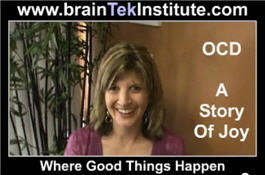Changed Lives : Obsessive-Compulsive Disorder (OCD)
According to the 2005 National Comorbidity Survey-Replication study, about 2.2 million American adults have obsessive-compulsive disorder (OCD), a brain disorder that often begins in childhood. The persistent, unwanted thoughts and rituals of OCD sometimes take over people’s lives to the point that they can’t work, maintain relationships, or engage in everyday tasks and social interactions.
For the family, life can be difficult and exhausting. OCD affects the entire family, often causing excess anxiety, stress, and depression for other family members. The person suffering with OCD feels just as down. They are aware of their rituals and compulsions, they are aware of the irrational behavior, but feel unable to control it.
This mother tells her son's story. The teen's doctor, school, and friends noticed the dramatic changes.
Obsessive / Compulsive Disorder (OCD)

Dr. D. taught me the difference between a ritual and a repetitive behavior. As a fighter pilot in wars and as a civilian commercial air pilot, I hadto be alert and composed for the safety of others, the mission, and myself. I had a list of pro-active safety duties I had to perform before each flight. I also had a list of repetitive behaviors that had to be performed before, during, and after each flight. I am a graduate of the Air Force Academy and a two-time Air Force Top Gun award winner.
I carried my flight behavior into my private life, and it became noticeable to family and friends.
Dr. D. taught me to manage my brain, expand my visual range, improve the timing and speed of my cognitive thought, and I am now in control of the OCD.
YESTERDAY:
The standard treatment for OCD was a type of long-term psychotherapy aimed at overcoming psychological defenses. There was no evidence that this treatment was effective. Clinicians lacked objective measurements that could help them accurately diagnose OCD – a crucial prerequisite for appropriate treatment. There were no proven medications for OCD. OCD was thought of primarily as a psychoanalytic issue, not a brain disorder.
TODAY:
BrainTek offers hope to families with effective assessments and protocols.
Schedule your appointment today by calling BrainTek: 858-222-9138
 |










